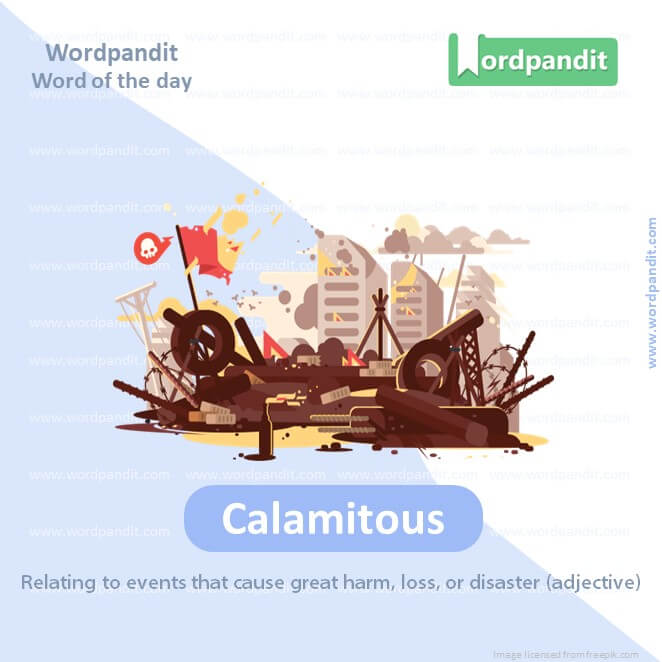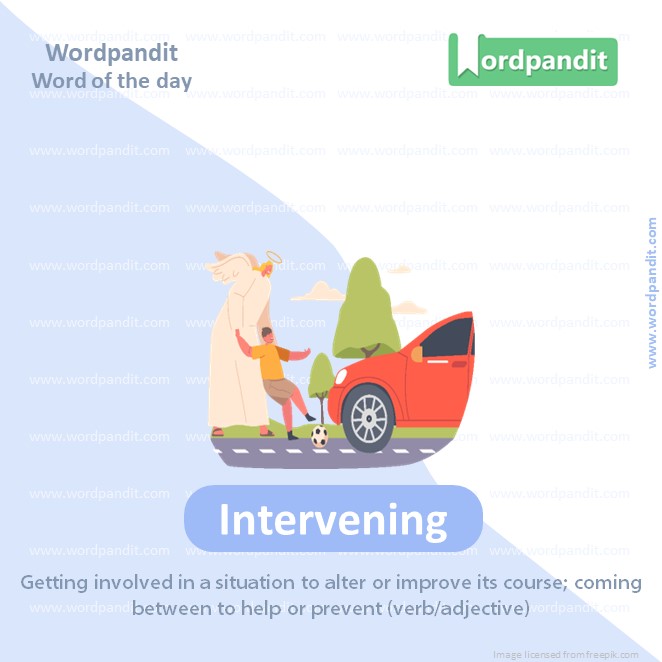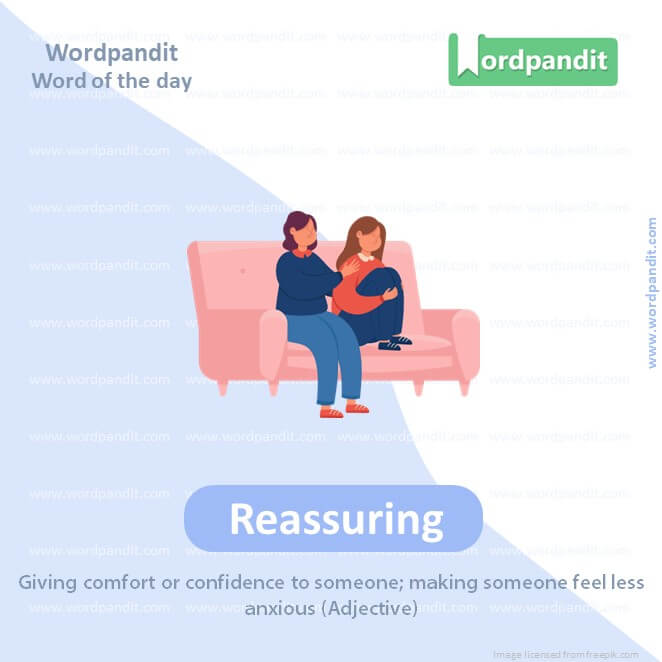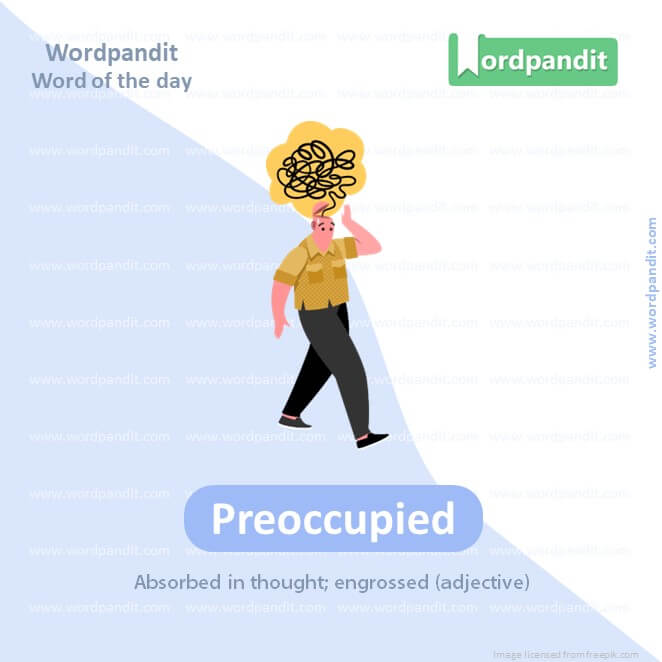Daily Vocabulary Words: List of Daily Used Words in Leading International Newspapers
Hi there. Welcome to this special section @ Wordpandit.
Our endeavour here is very simple: to highlight important daily vocabulary words, which you would come across in leading newspapers in the country. We have included the following newspapers in our selection:
• The New York Times
• The Washington Post
• Scientific American
• BBC
• The Guardian
• Psychology Today
• Wall Street Journal
• The Economist
We are putting in extensive work for developing your vocabulary. All you have got to do is be regular with this section and check out this post on a daily basis. This is your repository of words that are commonly used and essentially, we are posting a list of daily used words. Hence, this has significant practical application as it teaches you words that are used commonly in leading publications mentioned above.
Visit the website daily to learn words from leading international newspapers.

WORD-1: Calamitous
CONTEXT: She has a 37 percent approval rating, according to the latest 538 poll, which is even lower than Biden’s calamitous 39 percent, in what is a must-win year for Democrats, if not democracy itself.
SOURCE: New York Times
EXPLANATORY PARAGRAPH: Imagine you have a really bad day where everything goes wrong, like spilling your juice, breaking your favorite toy, and tripping over your shoelaces all at once. That’s like having a calamitous day, where things happen that make everyone unhappy and cause a lot of trouble.
MEANING: Relating to events that cause great harm, loss, or disaster (adjective).
PRONUNCIATION: kuh-LAM-i-tus
SYNONYMS: disastrous, catastrophic, tragic, devastating, ruinous, dire
USAGE EXAMPLES:
1. The flood was a calamitous event, leaving many homes destroyed.
2. They feared the new policy would have calamitous effects on the economy.
3. The calamitous earthquake caused widespread panic and destruction.
4. Her decision to quit school was seen as calamitous by her parents.

WORD-2: Flamingo
CONTEXT: Her 2020 run for the presidency was notable mainly for her inability to figure out what her positions were and for flaming out before the Iowa caucuses.
SOURCE: New York Times
EXPLANATORY PARAGRAPH: Think about when you see a fire burning brightly with lots of light and heat. That’s what flamingo is like. It’s like the bright, hot, orange and red colors you see in a campfire or when you light a candle.
MEANING: A tall wading bird with mainly pink or scarlet plumage and long legs and neck (noun).
PRONUNCIATION: FLAY-ming
SYNONYMS: blazing, burning, fiery, ablaze, ignited, scorching
USAGE EXAMPLES:
1. The flamingo torch lit up the dark room.
2. He was mesmerized by the flamingo sunset.
3. She wore a flaming red dress to the party.
4. They gathered around the flamingo campfire to stay warm.
WORD-3: Unassisted
CONTEXT: the North Star Ambulatory Assessment, used to test boys with D.M.D. on skills like balance, jumping and getting up from the floor unassisted.
SOURCE: New York Times
EXPLANATORY PARAGRAPH: Imagine trying to solve a really hard puzzle all by yourself, without anyone helping you. That’s what it means to do something unassisted. You do it on your own, without any help from friends, family, or anyone else.
MEANING: Done without any help or support from others (adjective).
PRONUNCIATION: un-uh-SIS-tid
SYNONYMS: alone, independently, solo, single-handedly, by oneself, autonomously
USAGE EXAMPLES:
1. She completed the project unassisted, which impressed her teacher.
2. The toddler took his first steps unassisted.
3. Climbing the mountain unassisted was a remarkable achievement.
4. She managed to solve the complex problem unassisted.

WORD-4: Intervening
CONTEXT: There’s another big role the government can play to accelerate gene therapies besides intervening in costs, and that’s to make the wheels of regulatory approval for these drugs less onerous.
SOURCE: New York Times
EXPLANATORY PARAGRAPH: Imagine you’re trying to watch your favorite cartoon, but your big brother keeps standing in front of the TV. He’s getting in the way, right? That’s like intervening, where someone or something comes in between you and what you’re trying to do or see.
MEANING: Getting involved in a situation to alter or improve its course; coming between to help or prevent (verb/adjective).
PRONUNCIATION: in-ter-VEEN-ing
SYNONYMS: mediating, interceding, interfering, inserting, interrupting, intermediary
USAGE EXAMPLES:
1. The coach’s timely intervening prevented a fight between the players.
2. In the intervening years, the city has changed a lot.
3. She appreciated her friend’s intervening in the argument.
4. The police are sometimes required to intervene in domestic disputes.
WORD-5: Conceded
CONTEXT: He said the medical establishment had been too dismissive of their plight, and he conceded that Congress had not done nearly enough to help.
SOURCE: New York Times
EXPLANATORY PARAGRAPH: Imagine you and your friend are racing, and you both think you won. But then, you see a video showing your friend crossed the finish line first, so you say, “Okay, you did win.” That’s like conceding, where you admit that something is true or that someone else is right after first not agreeing with it.
MEANING: Admitted that something is true or valid after first denying or resisting it (verb).
PRONUNCIATION: kuhn-SEED-ed
SYNONYMS: admitted, acknowledged, accepted, allowed, granted, recognized
USAGE EXAMPLES:
1. After a long debate, he finally conceded that she was right.
2. The losing candidate conceded the election.
3. She conceded defeat gracefully.
4. The company conceded to the demands of the workers.
WORD-6: Precision
CONTEXT: But it was Marshall who spoke with precision about the scientific literature.
SOURCE: New York Times
EXPLANATORY PARAGRAPH: Think about when you’re coloring and you try really hard to stay inside the lines. That’s being precise. It means doing something very carefully and exactly, without making mistakes or being sloppy.
MEANING: The quality of being accurate and exact (noun).
PRONUNCIATION: preh-SIZH-un
SYNONYMS: accuracy, exactness, preciseness, meticulousness, correctness, sharpness
USAGE EXAMPLES:
1. The mechanic worked with precision to fix the engine.
2. The recipe must be followed with precision to get the best results.
3. The surgeon’s precision saved the patient’s life.
4. They measured the dimensions with great precision.

WORD-7: Reassuring
CONTEXT: The N.I.H.’s long Covid initiative, called Recover, spent a substantial portion of that huge sum on a large but purely observational study that has so far yielded few practical results. Just two clinical trials only recently got underway. Neither is reassuring.
SOURCE: New York Times
EXPLANATORY PARAGRAPH: Imagine you’re scared because it’s stormy outside, but your mom hugs you and says everything will be okay. That makes you feel better and not scared anymore. That’s what reassuring means, making someone feel less worried or scared.
MEANING: Giving comfort or confidence to someone; making someone feel less anxious (Adjective).
PRONUNCIATION: ree-uh-SHUR-ing
SYNONYMS: comforting, encouraging, soothing, supportive, calming, heartening
USAGE EXAMPLES:
1. Her mother’s reassuring words helped calm her nerves.
2. The doctor gave them a reassuring smile.
3. He found the safety demonstration before the flight very reassuring.
4. The teacher’s reassuring presence made the students feel at ease.
WORD-8: Dwindling
CONTEXT: I truly didn’t expect that virtual therapy and brain games would jump to the front of the queue for those rapidly dwindling funds.
SOURCE: New York Times
EXPLANATORY PARAGRAPH: Think about a pile of cookies that gets smaller each time you take one to eat. The pile of cookies is dwindling, which means it’s getting smaller and smaller because cookies are being taken away.
MEANING: Gradually becoming smaller in size or amount (adjective); to diminish gradually in size, amount, or strength (verb).
PRONUNCIATION: DWIND-ling
SYNONYMS: decreasing, diminishing, lessening, shrinking, waning, tapering
USAGE EXAMPLES:
1. The dwindling resources made it hard for the campers.
2. She noticed her savings were slowly dwindling.
3. The crowd began to dwindle after midnight.
4. Efforts to save the endangered species were hampered by its dwindling habitat.

WORD-9: Preoccupied
CONTEXT: Mr. Assange has said or done in the intervening 14 years has altered my initial impression of him as a man unhealthily preoccupied with the shortcomings of democracies and suspiciously uninterested in the crimes of dictatorships.
SOURCE: New York Times
EXPLANATORY PARAGRAPH: Imagine you’re thinking really hard about what you want for your birthday, so much that you don’t notice your friend calling your name. That’s being preoccupied, when your mind is so full of one thing that you don’t pay attention to anything else.
MEANING: Absorbed in thought; engrossed (adjective).
PRONUNCIATION: pree-OK-yoo-pied
SYNONYMS: distracted, absorbed, engrossed, immersed, busy, consumed
USAGE EXAMPLES:
1. She was so preoccupied with her homework that she forgot about the time.
2. He walked into the room, preoccupied with his thoughts.
3. They were preoccupied with planning the event and missed the deadline.
4. Her preoccupied mind hardly noticed the beautiful scenery.
WORD-10: Extradition
CONTEXT: I had no sympathy for Mr. Assange when, facing extradition to Sweden on sex crime charges in 2012, he holed up in the Ecuadorean embassy in London.
SOURCE: New York Times
EXPLANATORY PARAGRAPH: Imagine if someone who did something really bad tries to hide in another place where they think no one can tell them off. But then, the place they’re hiding decides to send them back home to face consequences. That’s what extradition is, sending someone back to the place they ran away from to take responsibility for their actions.
MEANING: The official process of returning a person accused or convicted of a crime to the jurisdiction where the crime was committed (noun).
PRONUNCIATION: ek-struh-DISH-un
SYNONYMS: deportation, repatriation, handover, transfer, rendition, surrender
USAGE EXAMPLES:
1. The fugitive was arrested and faced extradition to his home country.
2. Extradition treaties help countries cooperate in criminal matters.
3. The court ruled in favor of his extradition.
4. She was fighting against her extradition on human rights grounds.
vocabulary enrichment
In the realm of language acquisition and proficiency, one crucial element takes center stage: vocabulary enrichment. The process of broadening one’s lexicon goes beyond mere word accumulation, it is an essential facet that enables effective communication, comprehensive understanding, and refined expression of thoughts.
Vocabulary enrichment should be approached as a continuous journey, an iterative process that is both interactive and dynamic. It begins with fostering an active interest in words and their meanings. A deep dive into the history, etymology, and the varied context in which a word is utilized often unveils captivating stories. This engagement with language paints a vivid picture, ensuring words stick in your memory and are easier to recall.
The second critical aspect to vocabulary enrichment involves reading. As you immerse yourself in diverse forms of literature – books, newspapers, blogs, or academic articles – you encounter an array of new words. Make it a habit to not gloss over these unknown terms, but rather seek their meanings and usage. Admission to this world of words will gradually extend your vocabulary breadth, amplifying your ability to comprehend complex concepts and communicate fluently.
Yet, vocabulary enrichment is not just about passively accumulating words, but actively using them. Include the new words learned in your daily conversations and writing. This not only reinforces their meaning but also familiarizes you with their appropriate usage.
Try out simple and engaging techniques like crosswords, word puzzles, and vocabulary apps. They keep the process fun and game-like, avoiding the monotony that can come with learning.
As a final note, remember that vocabulary enrichment is a marathon, not a sprint. It requires patience, persistence, and an undeniable curiosity about the power and magic of words. So, embark on this linguistic odyssey and discover the transformative impact vocabulary enrichment can have both professionally and personally.







